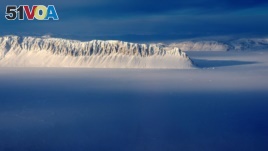10 August 2020
The last fully complete ice shelf in the Canadian Arctic has collapsed.
The Milne Ice Shelf is at the edge of Ellesmere Island, in the far northern Canadian territory of Nunavut. The ice shelf, researchers say, lost more than more than 40 percent of its area in just two days at the end of July.
"Above normal air temperatures, offshore winds and open water in front of the ice shelf are all part of the recipe for ice shelf break up," the Canadian Ice Service said on Twitter when it announced the loss earlier this month.

FILE PHOTO: Eureka Sound on Ellesmere Island in the Canadian Arctic is seen in a NASA Operation IceBridge survey picture taken March 25, 2014. Picture taken March 25, 2014. REUTERS/NASA/Michael Studinger/Handout/File Photo
Luke Copland is a glaciologist at the University of Ottawa and was part of the research team studying the Milne Ice Shelf. "...Cities are that size," he said. "These are big pieces of ice."
The shelf's area shrank by about 80 square kilometers. By comparison, the island of Manhattan in New York covers about 60 square kilometers.
The Arctic has been warming at two times the worldwide rate for the last 30 years. This year, temperatures in the polar area have been especially intense. The polar sea ice hit its lowest total amount for July in 40 years. Record heat and wildfires have burned Siberian Russia.
Summer in the Canadian Arctic this year has been 5 degrees Celsius above the 30-year average, Copland said. That has threatened smaller ice caps, which can melt quickly because they do not have the weight that larger glaciers have to stay cold. As a glacier disappears, more bedrock is left uncovered. This then speeds up the melting process.
A research camp, including instruments for measuring water flow through the ice shelf, was lost when the shelf at Ellesmere Island collapsed. "It is lucky we were not on the ice shelf when this happened," researcher Derek Mueller of Carleton University in Ottawa wrote in a recent online article.
Ellesmere also lost its two St. Patrick Bay ice caps this summer.
"It was only a matter of time," said Mark Serreze, director of the National Snow and Ice Data Center (NSIDC) in Boulder, Colorado.
Serreze and other scientists at the center had published a 2017 study predicting the ice caps were likely to disappear within five years. Scientists believe the ice caps formed several centuries ago.
Their disappearance, Serreze said, was confirmed last month, when NASA satellite images of the area showed a complete lack of snow and ice.
Serreze studied the ice caps as a student on his first trip to the Arctic many years ago. At the time, he said, the caps had seemed like immovable parts of the surrounding area.
"When I was there in the 1980s I knew every square inch of those ice caps," Serreze said. "You have the memories. It's like your first girlfriend."
Another two ice caps on Ellesmere - called Murray and Simmons - are also shrinking and are likely to disappear within 10 years, Serreze said.
I'm Ashley Thompson.
______________________________________________________________
Words in This Story
ice shelf - n. a floating sheet of ice attached to a landmass.
offshore - n. moving away from the shore toward the water
recipe - n. a way of doing something that will produce a particular result
glacier - n. a very large area of ice that moves slowly down a slope or valley or over a wide area of land
glaciologist - n. a person who studies glaciers
ice cap - n. a covering of ice over a large area, especially on the polar area of a planet.
bedrock - n. the solid rock that lies under the surface of the ground